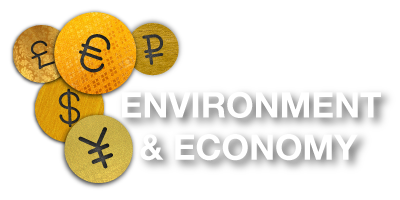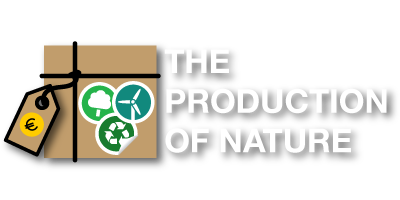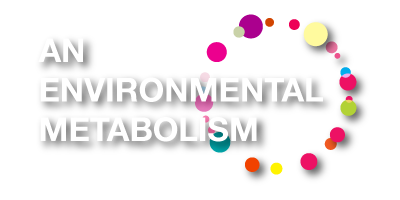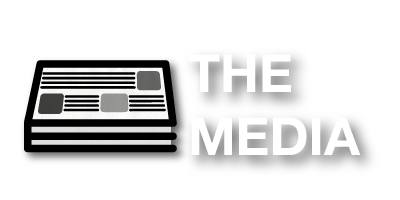In this section we discuss the influence that our current economic thought has on our concepts of the environment. It looks at the ideas of how nature is seen as a resource, how we might think of our relationship with nature as a metabolism, and the role of the media in communicating those ideas. Watch the animation below for an introduction.

In this section we discuss the influence that our current economic thought has on our concepts of the environment. It reveals that by default, economic logic sees environmental matters as external to economic matters. Therefore, it can be difficult to evaluate environmental costs and to weave them into economic models. Furthermore, the connection between the exponentially growing economy and the environment is an important one to consider for behaviour change towards sustainability.
The influence of the economy on the environment is increasing, as it has to, because the size of the economy needs to increase. Over time this means that the natural world itself is incorporated into the economy, where ‘even genetic identifications are now claimed as private property’ (Harvey 2014: 253). With this influence, we also see how concerns for the environment become discussed through economic factors, with, for example, a representative from the World Bank famously decreeing that Africa is ‘under-polluted’ (Foster 1993). We also see an increasing turn to the market to evaluate pollutants and to what extent they are dangerous or acceptable (Smith 2007a: 10-11). Furthermore, as the average temperature rises under conditions of climate change, profits stand to be made in the area of weather futures and indeed extreme weather events, seen in financial instruments such as hurricanes future markets (Smith 2007b: 777). Under our current model therefore, the economy and finance, are seen as significant actors in mitigating climate change. This scenario is firmly within the boundaries of ‘business as usual’, with little critique of how such financial instruments potentially add to the issues, or merely act as a temporary ‘fix’.
We therefore must consider that financial and market interventions potentially act merely a ‘fix’ to climate change and the need to move towards sustainability. They offer solutions to climate change without altering the economic status quo of compound economic growth.As we have seen, the economy is inherently crisis-prone and requires such ‘fixes’. However these fixes are only temporary ways of getting the economy out of immediate crisis, and merely move the problem around. However, even if these instruments are fixes, the importance placed on them by conventional economic thought potentially renders strategy hamstrung by requirements to leave the economic domain undisturbed. At worst, it could encourage society to actively participate in economic solutions only, while labouring under the misapprehension that there is no alternative to solutions that prioritise the economic status quo. Given the tensions between the current economic system and the requirement to move towards sustainability, this is a key systemic tension that needs to be taken into account when planning for behaviour change towards sustainability.

Given that the economy treats the environment as a resource, we need to explore how else to think about the economy and the environment. If alternative discussions of the potentials of social and cultural innovations are marginalised, we may not find the best portfolio of solutions to move society towards environmental sustainability. However, it is now well established that the marks that our economic system has left on the environment are all but indelible. The economic system that has used the ‘free gifts’ of nature for accumulation, at once treats the environment as an ‘externality’. As we have seen, the system requires growth, including spatial expansion, which transforms space for economic use. When one region has supplied all it can, capital moves on, leaving its detritus behind with no necessity to replenish or restore the space. Therefore, a key point for how we consider the economy and the environment is that capital transforms the environment upon which it acts. This is cumulative, with growth over time becoming more and more evident in its use of space and materials.
We therefore can consider the ‘production of nature’ as part of economic processes (Smith 2007a, b). The economic process ‘externalises’ natural resources, and assumes that the environment is ‘other’ or ‘out there’ to be used and manipulated. Contemporary economic thought, influenced by neoliberalism, also suggests that humans are merely individuals who want to maximise their utility in the marketplace (Sandel 2013). It therefore considers individuals in a very limited context, outside of the environment, which encourages thinking of the environment as ‘other’ and merely existing for exploitation of resources. Therefore, in current thought the ‘concepts of nature are less vanquished than co-opted to the present purpose’, that makes economic resources out of the environment and reduces and simplifies its complexities into being a resource for economic ends (Smith 2008: 11). Despite this erroneous and simplistic conception, the environment becomes something to be exploited and used as a universal and everlasting resource. Ideas of sustainability are therefore ignored, as the environment is seen as separate to society.
What these assumptions do not take account of is that humans are deeply embedded in natural processes even while at once most of society does not see those processes at work (Smith 2008: 28). Therefore, a more rounded way of thinking about the environment is largely precluded in the current economic system. A complex relationship has been reduced to discussions of ‘nature versus society’ or ‘economic versus environmental crisis’. The economy is seen to affect the external environment, or vice versa, where the environment is seen to affect the possibilities of continual and perpetual growth in the economy. The research suggests that this is not a helpful way to consider the interrelationship of society, economy and the environment.
To come to a more nuanced understanding of our relationship with the environment we need to look further than the default assumptions that our economic system would have us think.This project concurs with the observation that ‘an urgent necessity for the world today is […] to develop an understanding of the interconnections between the deepening impasse of the capitalist economy and the rapidly accelerating ecological threat – itself a by-product of capitalist development’ (Foster 1993: 1). This perspective acknowledges the pervasive impact of our economic development on the environment. It encourages dialogue with the two conceptual domains of economy and ecology in a way that acknowledges that the economy and the environment are deeply interconnected.

If we consider that the economy and the environment are interconnected, we can take the conceptual leap from thinking that the two areas are separate domains, to considering economic production in terms of a social process that takes place within ‘the universal metabolism of nature’ (Foster 2013: 5). If we consider the environment as a metabolism, we can begin to see how it provides wealth and resources that support society. However, this metabolism can proceed independent of human intervention, and indeed can exist without humans at all – although it would be a different metabolic system without humans. These observations encourage us to reimagine our relationship with the environment to encompass both the economy in nature and the nature in economy perspectives. Our economy is also an ecological system that has the potential to transform nature ‘all the way down’. However, its processes also take place within the environment and is therefore influenced by it. Therefore, if we consider this metabolism, we can think of this relationship as one that is deeply central to the sustainability of societies. Otherwise societies become vulnerable to an “irreparable rift in the interdependent process of social metabolism” (ibid.). This puts questions of stewardship, care and issues of environmental ethics more to the fore. The concept of metabolism therefore provides a way of acknowledging that economic production is a social process dependent on the integrity of environmental resources. If we degrade the resources to total depletion, production will no longer be possible.

Orthodox economics posits that the market is a public sphere where rational actors fairly buy and sell products based on their perceived worth. Therefore, consumerism is seen as ‘natural’ in contemporary economic thought. However, according to Baran and Sweezy’s theory of monopoly capital, since around the turn of the 20th century, the economy has been characterised less by dynamism and competition but by monopolistic tendencies, cartels and price-fixing. According to the theory, this has exacerbated stagnation tendencies in economies due to excess capacity. Under these conditions, consumption and investment cannot keep pace with productive capacity, and the core underlying tendency to stagnation presents itself ultimately in crisis. The excess surplus needs to find outlets, in what is known as the ‘waste’ economy. This waste economy is comprised of channels that do not provide a use-value, but are centred on exchange value that provides profits without a value based in the material, ‘real’ or productive economy. Also included in this part of the unproductive economy is what Baran and Sweezy termed the ‘sales effort’ of advertising, which included wasteful practices such as ‘spurious product differentiation, artificial physical and/or “moral” obsolescence’ (Baran and Sweezy 2013a: 35). The sales effort through media and advertising industries is therefore of importance to us when considering the role of the media in behaviour change towards sustainability.
A key characteristic of industrialised media is as a ‘cultural apparatus’ where such media intends to ‘reach and influence the largest possible audiences’ (Baran and Sweezy 2013a: 40), rather than serving educational or informational materials to audiences. This aim, rather than promoting alternative, radical or even democratic views ‘motivates the promotion of least controversial, hackneyed, and corny productions’ (ibid.) in the service of profit-making. Even when the materials are shocking, lurid or extreme in content, they are conservative in terms of critiquing existing structures and thus should not be confused with notions of such media being in any way rebellious or radical in terms of new transformative practices (Baran and Sweezy 2013b: 61).
The sales effort of advertising is part of the ‘waste’ economy that is involved in the persuasion of citizens to consume. The media and cultural industries are therefore implicated in the production of non-useful ‘waste’ for the absorption of profits. In the environmental context, this ‘cultural apparatus’ does not concern itself with promoting less wasteful and consumptive norms that could move societal practices towards more sustainability. Rather, by needing to appeal to the widest of audiences, it promotes the absorption of excess productive capacity through consumerism. In this form, these industries are concerned with creating a ‘mass society culture’ centred on commodification and incorporation of more and more social areas into the market (Foster and McChesney 2013: 4). To the extent that the media industries are implicated in foregrounding ‘business as usual’, rather than attempting to discuss new, alternate or better ways to help the environment is therefore key to understanding how it can help societies to move to more sustainable futures.
REFERENCES
Foster, J.B., 1993. “Let them eat pollution”: capitalism and the world environment. Monthly Review, 44(8), pp.10–20.
Smith, N., 2007a. Nature as accumulation strategy. Socialist register, 2007, p.16.
Smith, N., 2007b. Disastrous Accumulation. South Atlantic Quarterly, 106(4), pp.769–787.
Smith, N., 2008. Uneven Development, Athens: University of Georgia Press.
Foster, J.B., 2013. The Epochal Crisis. Monthly Review, 65(5), pp.1–13.
Baran, P.A. & Sweezy, P.M., 2013a. Theses on Advertising. Monthly Review, 65(3), pp.34–42.
Baran, P.A. & Sweezy, P.M., 2013b. The Quality of Monopoly Capitalist Society: Culture and Communications. Monthly Review, 65(3), pp.43–64.